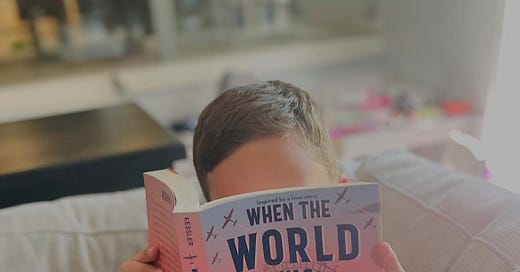From the Playground to the Bar: Where Hate Grows
From antisemitic bottle service to MAGA rage—why parenting with empathy is now a radical act.
This morning, I came across an Instagram post about a disturbing incident at a bar in Philadelphia, reportedly owned by Dave Portnoy. A group of young men, students at Temple University, had a sign at their table that read “f–k the Jews.” The full story includes that they ordered bottle service—and with it, a custom light-up sign that requested to say “f–k the Jews.” The person who shared today’s post didn’t offer any commentary, just told followers to “discuss.” But I can’t stop thinking about it.
Another part that concerns me is how the story was originally shared—stripped of nuance, lacking full context. Simply messaging that this happened and what the sign said along with a call to “discuss.” This is part of the problem. Influencers have a responsibility to tell the whole story—not just the most shocking or clickable part. When we isolate the outrage without the facts, without the accountability, without the why, we feed an algorithm, not a conversation. And this is exactly how young men—our sons—end up falling into toxic content. They’re served pieces of stories without the values to interpret them. Without the full picture, they’re left to fill in the gaps with misinformation, cruelty, or worse—apathy. We need leaders who don’t just “drop” content, but actually stand in truth and invite people to think critically and compassionately.
Let me say it clearly: this isn’t just a moment of ignorance—it’s a moment of active, hateful participation. These young men felt comfortable enough to pay for and display an antisemitic message, and more disturbingly, a bar staff complied without anyone stepping in. Where was the supervisor? The manager? The decency?
Portnoy’s initial reaction was to fire the waitstaff and “ruin the lives” of the men who ordered the sign. He then pivoted, deciding to send the young men to Auschwitz, hoping to turn it into a teachable moment. Some people are angry that this punishment is “a free vacation,” and others think Israel would be a more appropriate destination. Either way, this incident raises much bigger questions: Why did these men think this was okay? Why did anyone in that establishment go along with it?
This didn’t happen in a vacuum. We are seeing a rise in hate, especially among young men in their 20s. Many of them live in isolated digital worlds, shaped by algorithms and influencers who fuel division. Some of the most vocal supporters of Trump and his MAGA ideology fall into this exact demographic. And yet, somehow, the blame keeps getting deflected onto “leftists,” as though believing in empathy, in teaching children about slavery or the Holocaust, is the problem.
I’ve been called a “woke leftist lunatic” more than once, simply because I believe in raising kids who care about others. I’m a mom to four kids—two stepchildren who are now adults, and two younger children of my own. My 26-year-old stepson regularly talks with me about the world, sharing his disgust at how figures like Charlie Kirk show up in his social media feed, spreading hate and manipulation. My 10-year-old and I read books together about World War II. As a family, we’ve attended reunions of my father-in-law’s WWII division and know veterans who personally helped liberate concentration camps.
Hate is learned at home…and so is empathy. My son recently read When The World Was Ours and cried at how one character, a boy named Max, was slowly shaped into a Nazi by his father. It opened up a powerful conversation about how racism and antisemitism aren’t inherent, they’re taught.
Sadly, my son has already witnessed racism at school. During the last election, he heard classmates saying that Kamala Harris “isn’t Black” and “doesn’t know where she comes from.” I recently saw a mother make sure her daughter wasn’t seated next to a Mexican child on the bus. Her daughter and her friend cheered when he was moved. That’s not something a child invents—that’s learned behavior.
We should all be deeply concerned about what’s happening with young men today. Many came out of the pandemic more isolated than ever. They work from home, spend hours online, and in some cases, don’t even speak to another human being in person during the day. I’ve heard parents say their sons’ only daily interaction is with a DoorDash driver.
Moms—we need to wake up. So do dads, but I’m speaking to you, as a mother. Our schools are under threat from politicians who want to erase history that makes anyone “uncomfortable.” But discomfort is how we learn. Avoiding hard conversations only opens the door to ignorance and hate. If we don’t teach about the Holocaust, or slavery, or systemic injustice, we allow history to repeat itself.
What happened at that bar was a failure on multiple levels. Yes, those young men were wrong and should be held accountable. But so should the staff who went along with it. Someone—anyone—should have said, “No. We don’t serve hate here.” Why didn’t they?
Can a trip to Auschwitz change these young men? Maybe. If it comes with deep, honest conversations—before, during, and after. But will the staff at the bar get training? Will the culture that allowed this moment be addressed?
In an era of keyboard warriors and a political climate where hate is normalized, it’s more important than ever to stand up, speak out, and reject the idea that empathy is a weakness. The irony is rich: those of us who are mocked for being “too woke” are the ones demanding accountability and fighting to ensure this never happens again.
America is no longer split down political lines. It’s split between those who hate and those who care. Which side are you on?





